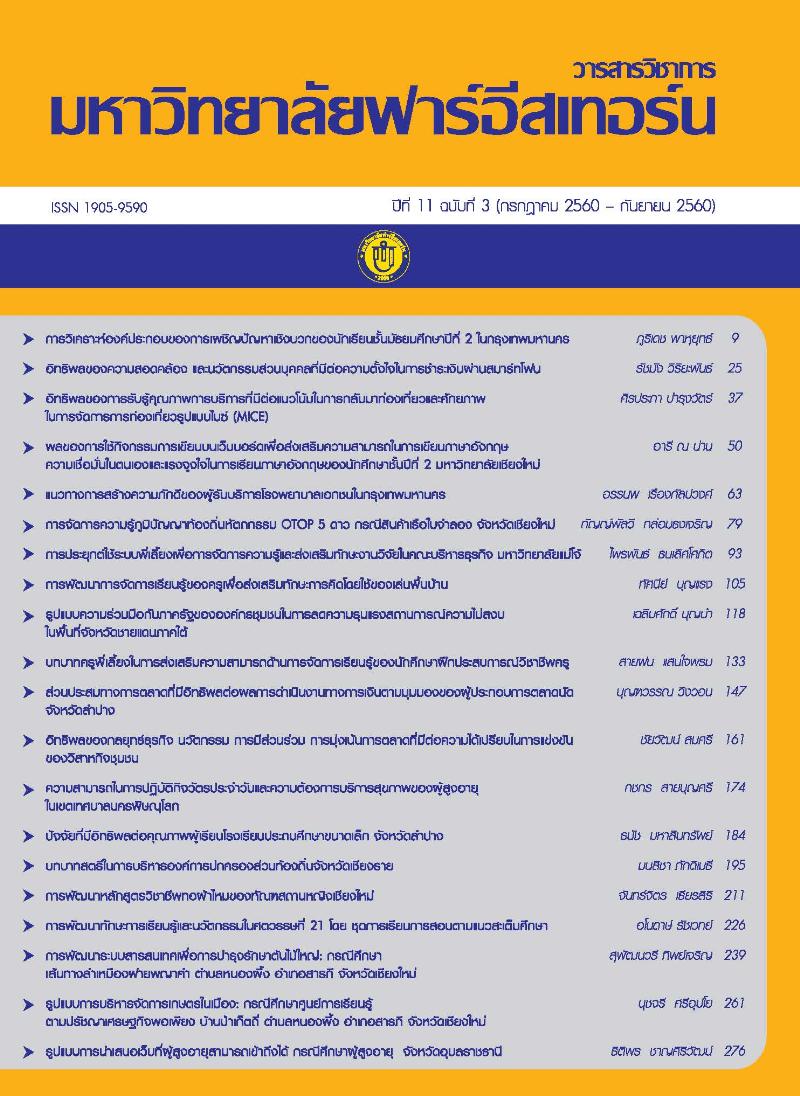Enhancing CMU Second Year Students’ English Writing Ability, Self-Confidence, and Motivation for Learning by Implementing Web Board Writing Activities
Main Article Content
Abstract
การวิจัยครั้งนี้มีวัตถุประสงค์คือ1) ศึกษาความสามารถในการเขียนภาษาอังกฤษของนักศึกษาก่อน
และหลังการเข้าร่วมกิจกรรมการเขียนผ่านเว็บบอร์ด 2) ศึกษาความเชื่อมั่นในตนเองของนักศึกษาก่อนและ
หลังการเข้าร่วมกิจกรรมการเขียนผ่านเว็บบอร์ด และ 3) ศึกษาแรงจูงใจในการเรียนภาษาอังกฤษของนักศึกษา
ก่อนและหลังการเข้าร่วมกิจกรรมการเขียนผ่านเว็บบอร์ด โดยประชากรที่ใช้ในการวิจัยครั้งนี้คือนักศึกษา
ชั้นปีที่ 2 มหาวิทยาลัยเชียงใหม่จังหวัดเชียงใหม่ที่ลงทะเบียนเรียนกระบวนวิชา 001201 Critical Reading
and Effective Writing ผู้วิจัยได้ทำการสุ่มตัวอย่างโดยใช้หลักการการสุ่มตัวอย่างแบบเจาะจงและ
การสุ่มตัวอย่างแบบพิจารณาตามความสะดวกร่วมกัน ดังนั้น กลุ่มตัวอย่าง คือ นักศึกษาที่ลงทะเบียนเรียน
ในตอน (Section) ที่ผู้วิจัยเป็นผู้สอน เครื่องมือที่ใช้ในการเก็บรวบรวมข้อมูล ได้แก่ แบบวัดความสามารถใน
การเขียนภาษาอังกฤษ แบบวัดความเชื่อมั่นในตนเอง และแบบวัดแรงจูงใจในการเรียนภาษาอังกฤษ สำหรับ
การวิเคราะห์ข้อมูลโดยสถิตินั้น ทำโดยการหาค่าเฉลี่ย ส่วนเบี่ยงเบนมาตรฐาน และ t-testหลังจากนักศึกษา
ได้เข้าร่วมกิจกรรมการเขียนผ่านเว็บบอร์ดเป็นเวลา 6 สัปดาห์ พบว่า
1. คา่ เฉลยี่ จากคะแนนการเขียนภาษาอังกฤษของนักศึกษาหลังเขา้ รว่ มกิจกรรมการเขียนผา่ นเว็บบอรด์
สูงขึ้น (Mean =13.85)กว่าค่าเฉลี่ยก่อนเข้าร่วมกิจกรรม(Mean =10.90)
2. หลังเข้าร่วมกิจกรรมการเขียนผ่านเว็บบอร์ดค่าเฉลี่ยของความเชื่อมั่นในตนเองของนักศึกษาสูงขึ้น
(Mean = 1.71)กว่าค่าเฉลี่ยก่อนเข้าร่วมกิจกรรม(Mean = 2.13)
3. ค่าเฉลี่ยแรงจูงใจในการเรียนภาษาอังกฤษของนักศึกษาหลังเข้าร่วมกิจกรรมสูงขึ้น (Mean =1.65)
กว่าค่าเฉลี่ยก่อนเข้าร่วมกิจกรรม (Mean = 2.16)
The purposes of this study were 1) to examine English writing ability of the students before
and after the implementation of web board writing activities 2) to study the students’ self-confidence
before and after implementing the web board writing activities and 3) to study the motivation
for learning English of the students before and after the web board writing activity implementation.
The population of the study was second year students of Chiang Mai University who were studying
the Fundamental English course (001201: Critical Reading and Effective Writing). The combination
of purposive sampling and convenience sampling was applied in the research. Therefore,
the subjects were students in the section taught by the researcher. The experimental instruments
consisted of four web board activities, an English writing ability test, a self-confidence test and a
motivation test. The tests were administered both before and after the experiment. The data obtained
were analyzed by using mean, standard deviation and t-test.
After implementing web board activities for six weeks, the results were as follows:
1. The mean score of students’ writing test improved from 10.90 on the pretest to 13.85
on the posttest.
2. The students’ self-confidence mean score rose from an average score of 1.71 to 2.13.
3. The students’ motivation for learning English mean score was higher, increasing from
1.65 to 2.16.
Article Details
1. Any views and comments in the FEU Academic Review Journal are the authors’ views. The editorial staff have not to agree with those views and it is not considered as the editorial’s responsibility.
2. The responsibility of content and draft check of each article belongs to each author. In case, there is any lawsuit about copyright infringement. It is considered as the authors’ sole responsibility.
3. The article copyright belonging to the authors and the Far Eastern University are copyrighted legally. Republication must be received direct permission from the authors and the Far Eastern University in written form.
References
Al-Hebaish, S. M. (2012). The Correlation between General Self-Confidence and Academic Achievement in the Oral Presentation Course. Theory and Practice in Language Studies, 2(1), 60-65.
Arbaugh, J. B. (2000). Virtual Classroom versus Physical Classroom: An Exploratory Study of Class Discussion Patterns and Student Learning in an Asynchronous Internet-Based MBA Course. Jourrnal of Management Education, 24(2), 213-233.
Boonma, S. (1999). Development of Interactive Journal Writing Activities to Enhance Writing Skills and Motivation for Mathayom Suksa 5 Students. (M.Ed. Teaching English as a Foreign Language), Chiang Mai University.
Chanrungkanok, P., & Gebhard, J. G. (2004). A Naturalistic Study of the Integration of Computer-mediated Communication into Oral Discussion in an EFL College Classroom in Thailand. (Doctoral Dissertation), Indiana University of Pennsylvania.
Cheng, Y.-s. (2002). Factors Associated with Foreign Language Writing Anxiety. Foreign Language Annals, 33(5).
Cheung, L. (2008). The Application of Web Bulletin Board in English Language Teaching. Hong Kong Journal of Applied Linguistics, 11(1), 27-44.
Dejthongpong, S. (2002). Effects of Web Collaborative Tools in Web-Based Instruction upon Metacognition and English Writing Competency between Thai and Chinese University Students. (Ph.D. Education), Chulalongkorn University.
Dörnyei, Z. (2001). Motivational Strategies in the Language Classroom: Cambridge University Press.
Gangula, A., & Eliah, P. (2015). The Art of Effective Writing: A Critical Evaluation. Research Journal of English Language and Literature, 3(2), 51-65.
Khoii, R. (2011). A Solution to the Dilemma of Writing in a Foreign Language: Adaptive Mentorship. Intenational Journal for Cross-Disciplinary Subjects in Education, 2(4).
Kitchakarn, O. (2014). Developing Writing Abilities of EFL Students through Blogging. Turkish Online Journal of Distance Education-TOJDE, 15(4), 34-47.
Kitjaroonchai, N., & Kitjaroonchai, T. (2012). Motivation toward English Language Learning of Thai Students Majoring in English at Asia-Pacific International University. Catalyst, 7(1), 21-38.
Muangsamai, P. (2005). Integration of Online Learning Management System into English Course: What do learners think? Paper presented at the 43rd Kasetsart University Annual Conference : Education, Agricultural Extension and Communication, Social Sciences, Economics, Business Administration, Humanities, Home Economics, Bangkok.
Rollag, K. (2010). Teaching Business Cases Online Through Discussion Boards: Strategies and Best Practices. Journal of Management Education, 34(4), 499-526.
Siegel, D., Ward, L., & McCoach, D. B. (2001). Instructional Webboard Strategies in Secondary Education and University Teaching. Paper presented at the American Educational Research Association, Seattle.
Soureshjani, K. H., & Naseri, N. (2001). An Investigation into the Relationship between Self-esteem,Proficiency Level, and the Reading Ability of Iranian EFL Languae Learners. Journal of Language Teaching and Research, 2(6), 1312-1319.
Weigle, S. C. (2014). Considerations for Teaching Second Language Writing. In M. Celce-Murcia, D. M. Brinton & M. A. Snow (Eds.), Teaching English as a Second or Foreign Language (4th ed.). Boston: National Geographic Learning.
Wilson, M., & Fairchild, C. (2010). Collaborative Learning and the Importance of the Discussion Board. Journal of Diagnostic Medical Sonography, 27(1), 45-51.
Zarei, N., Hussin, S., & Rudravarapu, R. (2015). Learning Management Blog: Enhancing Learners' Learning Tasks in a Language Course. Research Journal of English Language and Literature, 3(2), 96-105.
